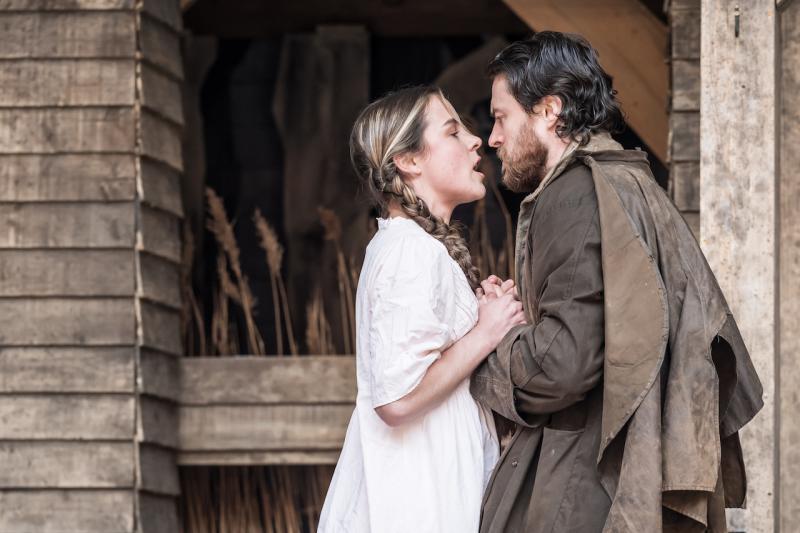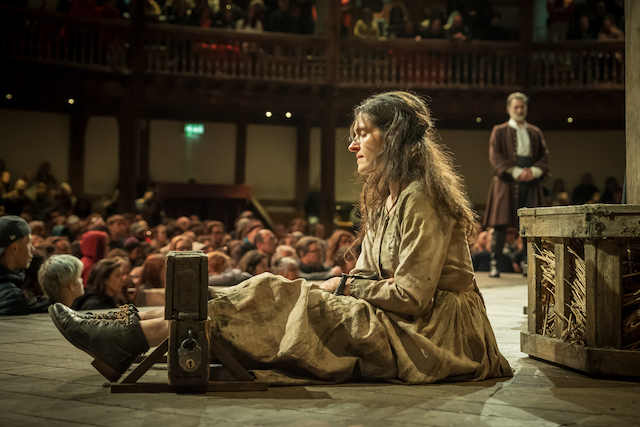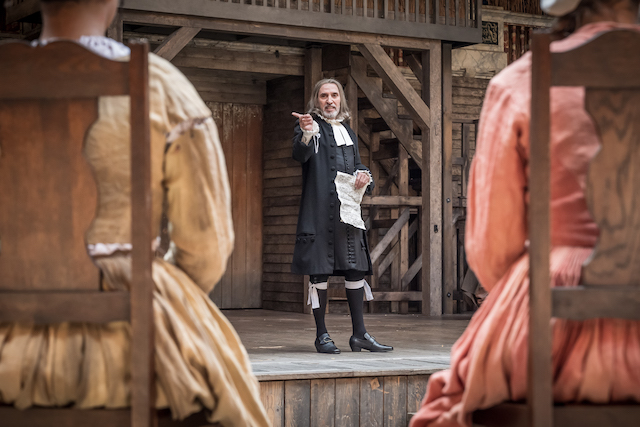The Crucible, Shakespeare's Globe review - stirring account of paranoia and prejudice | reviews, news & interviews
The Crucible, Shakespeare's Globe review - stirring account of paranoia and prejudice
The Crucible, Shakespeare's Globe review - stirring account of paranoia and prejudice
Ince's fidelity to the language allows every nuance to be exposed

A society ruled by hysteria. Lurid lies that carry more currency than reality. There’s no shortage of reasons that Arthur Miller’s 1953 drama about witchcraft and revenge resonates so strongly today.
In an article in the New Yorker he described how he wrote the play as an “act of desperation” that was “motivated in some great part by the paralysis that had set in among many liberals”. Back then, the paralysis was in response to the tyranny of McCarthyism – now it’s the result of more complex forces that many of us are still trying to decode.
Ola Ince’s blistering, humane production paints the play in vivid colours, highlighting how each element contributes to Miller’s scalpel sharp dissection of paranoia and prejudice. In 2021 she attracted headlines for an abrasively contemporary production of Romeo and Juliet that focused – too much, some people believed – on mental health. Yet here – despite the contemporary resonances – she reveals the power of what Miller wrote by straightforwardly excavating every nuance of the 17th century setting.
It’s an approach that reaps dividends. Shorn of gimmickry, this becomes a character-driven drama that inspires both laughter and stunned silence from the audience. Even as a critic who was sceptical about the concept underpinning Ince’s Romeo and Juliet, I was impressed by how the actors’ crystal-clear delivery of the dialogue revealed aspects of the characters I hadn’t appreciated before. Here, once more, Ince’s fidelity to the language and the way it’s spoken allows every nuance of the play to be exposed in its cruel, glittering glory. Amelia Jane Hankin’s stripped back wooden set starkly evokes 17th century Puritan America. As the play opens – to the stern accompaniment of drums – we find Steve Furst’s distraught Reverend Parris ranting over the unconscious body of his daughter, Betty, who has collapsed after being discovered conjuring spirits with friends late at night in the woods. On press night, Sara Belcher’s Ann Putnam got one of the evening’s first laughs by asking “How high did she fly?” while gesticulating towards a helicopter that was trying to steal the show just above the Globe. Yet the draw of the action on stage proved strong enough to blot out even the most persistent of 21st-century technological distractions.
Amelia Jane Hankin’s stripped back wooden set starkly evokes 17th century Puritan America. As the play opens – to the stern accompaniment of drums – we find Steve Furst’s distraught Reverend Parris ranting over the unconscious body of his daughter, Betty, who has collapsed after being discovered conjuring spirits with friends late at night in the woods. On press night, Sara Belcher’s Ann Putnam got one of the evening’s first laughs by asking “How high did she fly?” while gesticulating towards a helicopter that was trying to steal the show just above the Globe. Yet the draw of the action on stage proved strong enough to blot out even the most persistent of 21st-century technological distractions.
Part of this is in no small part down to the electric performance of Hannah Saxby as Abigail Williams. Saxby, who only graduated last year from the Royal Welsh College of Music and Drama, is an agitated, animated presence, going from wide-eyed innocence, to petulance, to seductiveness in seconds. This is no game for her, but a fight for survival – underscored by her declaration that “I saw Indians smash my dear parents’ heads on the pillow next to mine”.
She is more than matched by Gavin Drea’s virile, dubiously honourable John Proctor. From the moment he enters, the ongoing sexual tension between them is clear. Yet while some may dub him a predator there's integrity too in his acknowledgement of the feelings he's had for her. A key part of the production's strength comes from the intensity of his internal struggle as his fury at the hysteria around him allows his love for his wife to reignite once more.
Phoebe Pryce’s Elizabeth Proctor too (main picture) is a profoundly empathetic presence – gnawed away by unhappiness at the same time as she declares that she has in part driven her husband away from her. Yet the slow-burning respect between the two is the strongest dynamic. At the point in the evening when she refuses to denounce her husband publicly for adultery the pin drop silence is palpable. Such strong central performances don’t obscure the fact that this is a wonderful ensemble production, alive with Hogarthian detail. Whether it’s Howard Ward’s Giles Corey, worrying that his wife reads too much (a comic detail that quickly becomes tragic) or Bethany Wooding’s Mary Warren silently freaking out that the Reverend Parris has seen her naked, we get the full sense of the different agendas animating Salem society.
Such strong central performances don’t obscure the fact that this is a wonderful ensemble production, alive with Hogarthian detail. Whether it’s Howard Ward’s Giles Corey, worrying that his wife reads too much (a comic detail that quickly becomes tragic) or Bethany Wooding’s Mary Warren silently freaking out that the Reverend Parris has seen her naked, we get the full sense of the different agendas animating Salem society.
Jo Stone-Fewings’ Reverend Hale is a fascinating, complex presence – revelling in his virtue at the start, only to become consumed with despair that he has been intrinsic to the perpetuation of a mass injustice. Gareth Snook’s strangely delightful Deputy Governor Danforth (pictured above) – with his posh long bob and white ribbons round his socks – manages to provoke laughter at his self-regarding vanity at the same time as we are devastated by his pronouncements.
Hilary Belsey’s musical direction of Renell Shaw’s drum and brass dominated score – which stays true to the Puritan theme by deriving its power from its simplicity – sets the seal on a high-quality evening. This is a weighty contribution to the Globe’s summer season that simultaneouly marks Ince's maturing as a director.
The future of Arts Journalism
You can stop theartsdesk.com closing!
We urgently need financing to survive. Our fundraising drive has thus far raised £49,000 but we need to reach £100,000 or we will be forced to close. Please contribute here: https://gofund.me/c3f6033d
And if you can forward this information to anyone who might assist, we’d be grateful.

Subscribe to theartsdesk.com
Thank you for continuing to read our work on theartsdesk.com. For unlimited access to every article in its entirety, including our archive of more than 15,000 pieces, we're asking for £5 per month or £40 per year. We feel it's a very good deal, and hope you do too.
To take a subscription now simply click here.
And if you're looking for that extra gift for a friend or family member, why not treat them to a theartsdesk.com gift subscription?
more Theatre
 The Producers, Garrick Theatre review - Ve haf vays of making you laugh
You probably know what's coming, but it's such great fun!
The Producers, Garrick Theatre review - Ve haf vays of making you laugh
You probably know what's coming, but it's such great fun!
 Not Your Superwoman, Bush Theatre review - powerful tribute to the plight and perseverance of Black women
Golda Rosheuvel and Letitia Wright excel in a super new play
Not Your Superwoman, Bush Theatre review - powerful tribute to the plight and perseverance of Black women
Golda Rosheuvel and Letitia Wright excel in a super new play
 Cow | Deer, Royal Court review - paradox-rich account of non-human life
Experimental work about nature led by Katie Mitchell is both extraordinary and banal
Cow | Deer, Royal Court review - paradox-rich account of non-human life
Experimental work about nature led by Katie Mitchell is both extraordinary and banal
 Deaf Republic, Royal Court review - beautiful images, shame about the words
Staging of Ukrainian-American Ilya Kaminsky’s anti-war poems is too meta-theatrical
Deaf Republic, Royal Court review - beautiful images, shame about the words
Staging of Ukrainian-American Ilya Kaminsky’s anti-war poems is too meta-theatrical
 Laura Benanti: Nobody Cares, Underbelly Boulevard Soho review - Tony winner makes charming, cheeky London debut
Broadway's acclaimed Cinderella, Louise, and Amalia reaches Soho for a welcome one-night stand
Laura Benanti: Nobody Cares, Underbelly Boulevard Soho review - Tony winner makes charming, cheeky London debut
Broadway's acclaimed Cinderella, Louise, and Amalia reaches Soho for a welcome one-night stand
 The Pitchfork Disney, King's Head Theatre review - blazing with dark energy
Thrilling revival of Philip Ridley’s cult classic confirms its legendary status
The Pitchfork Disney, King's Head Theatre review - blazing with dark energy
Thrilling revival of Philip Ridley’s cult classic confirms its legendary status
 Born with Teeth, Wyndham's Theatre review - electric sparring match between Shakespeare and Marlowe
Rival Elizabethan playwrights in an up-to-the-minute encounter
Born with Teeth, Wyndham's Theatre review - electric sparring match between Shakespeare and Marlowe
Rival Elizabethan playwrights in an up-to-the-minute encounter
 Interview, Riverside Studios review - old media vs new in sparky scrap between generations
Robert Sean Leonard and Paten Hughes make worthy sparring partners
Interview, Riverside Studios review - old media vs new in sparky scrap between generations
Robert Sean Leonard and Paten Hughes make worthy sparring partners
 Fat Ham, RSC, Stratford review - it's Hamlet Jim, but not as we know it
An entertaining, positive and contemporary blast!
Fat Ham, RSC, Stratford review - it's Hamlet Jim, but not as we know it
An entertaining, positive and contemporary blast!
 Juniper Blood, Donmar Warehouse review - where ideas and ideals rule the roost
Mike Bartlett’s new state-of-the-agricultural-nation play is beautifully performed
Juniper Blood, Donmar Warehouse review - where ideas and ideals rule the roost
Mike Bartlett’s new state-of-the-agricultural-nation play is beautifully performed
 The Gathered Leaves, Park Theatre review - dated script lifted by nuanced characterisation
The actors skilfully evoke the claustrophobia of family members trying to fake togetherness
The Gathered Leaves, Park Theatre review - dated script lifted by nuanced characterisation
The actors skilfully evoke the claustrophobia of family members trying to fake togetherness
 As You Like It: A Radical Retelling, Edinburgh International Festival 2025 review - breathtakingly audacious, deeply shocking
A cunning ruse leaves audiences facing their own privilege and complicity in Cliff Cardinal's bold theatrical creation
As You Like It: A Radical Retelling, Edinburgh International Festival 2025 review - breathtakingly audacious, deeply shocking
A cunning ruse leaves audiences facing their own privilege and complicity in Cliff Cardinal's bold theatrical creation

Add comment